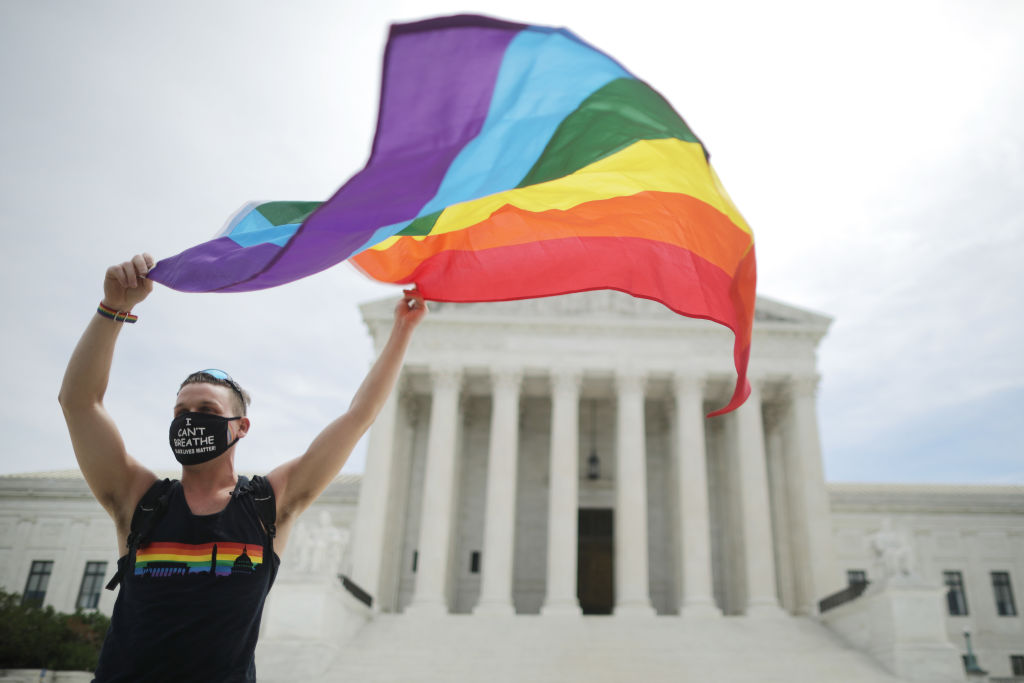Joseph Fons holding a Pride Flag in front of the U.S. Supreme Court building last week (Chip Somodevilla/Getty)
An incredible 90 per cent of people in the United States agree with the Supreme Court ruling banning workplace discrimination for LGBT+ people, according to a new poll.
Last week, the US Supreme Court ruled that LGBT+ people are entitled to protection from discrimination based on sexual orientation and gender identity in the workplace.
The surprise ruling extends sex-based employment discrimination protections to LGBT+ people in all 50 states.
And a new nationally representative poll of 1,001 adults in America has found that the vast majority of the public support the ruling.
90 per cent of adults support the momentous Supreme Court ruling on LGBT+ discrimination.
The poll, which was conducted by the Kaiser Family Foundation (KFF), found that 9 in 10 adults (90 per cent) agreed that it should be illegal to fire people because of their sexual or gender identity.
The poll also found that 7 in 10 Republicans agree that discrimination against LGBT+ people in the workplace should be illegal.
However, Republicans are also less likely to believe that LGBT+ people, as well as Black and Hispanic people, face discrimination.
Elsewhere, pollsters found that 69 per cent of adults support laws that ban discrimination against lesbian, gay and bisexual people, while 68 per cent believe trans people should be legally protected from discrimination.
That figure is similar to the percentage of people who support laws banning discrimination based on race (71 per cent) and disability (76 per cent).
Meanwhile, 79 per cent of those surveyed believe trans people face at least some discrimination in the United States, while 74 per cent thought the same was true for lesbian, gay and bisexual people.
The public is shifting more quickly on these issues than the political and legal landscapes are.
The poll revealed that 49 per cent of Americans believe society has “not gone far enough in accepting people who are transgender”, up 10 percentage points from a 2017 poll.
Conversely, just 15 per cent said society has “gone too far” in accepting trans people, while 32 per cent said it “has been about right”.
The poll was conducted between June 16-21 through telephone interviews in English and Spanish.
“Most Americans – including most Republicans – oppose discrimination against people who are lesbian, gay, bisexual, or transgender,” said KFF president Drew Altman.
“The public is shifting more quickly on these issues than the political and legal landscapes are.”
The ruling found that an employer who fires an LGBT+ employee because of their identity ‘defies the law’.
The poll comes just over a week after the Supreme Court delivered its surprise ruling.
In the court’s 6-3 ruling, conservative justice Neil Gorusch said: “It is impossible to discriminate against a person for being homosexual or transgender without discriminating against that individual based on sex.
“We do not hesitate to recognise today a necessary consequence of that legislative choice: An employer who fires an individual merely for being gay or transgender defies the law,” he said.
The ruling went against the Trump administration, which had intervened in the case to argue that the Civil Rights Act does not apply to LGBT+ people.
Trump’s Department of Justice had sought to assert that the Title VII provisions should only apply based on the “ordinary meaning of sex” as male or female, not covering sexual orientation or gender identity.
